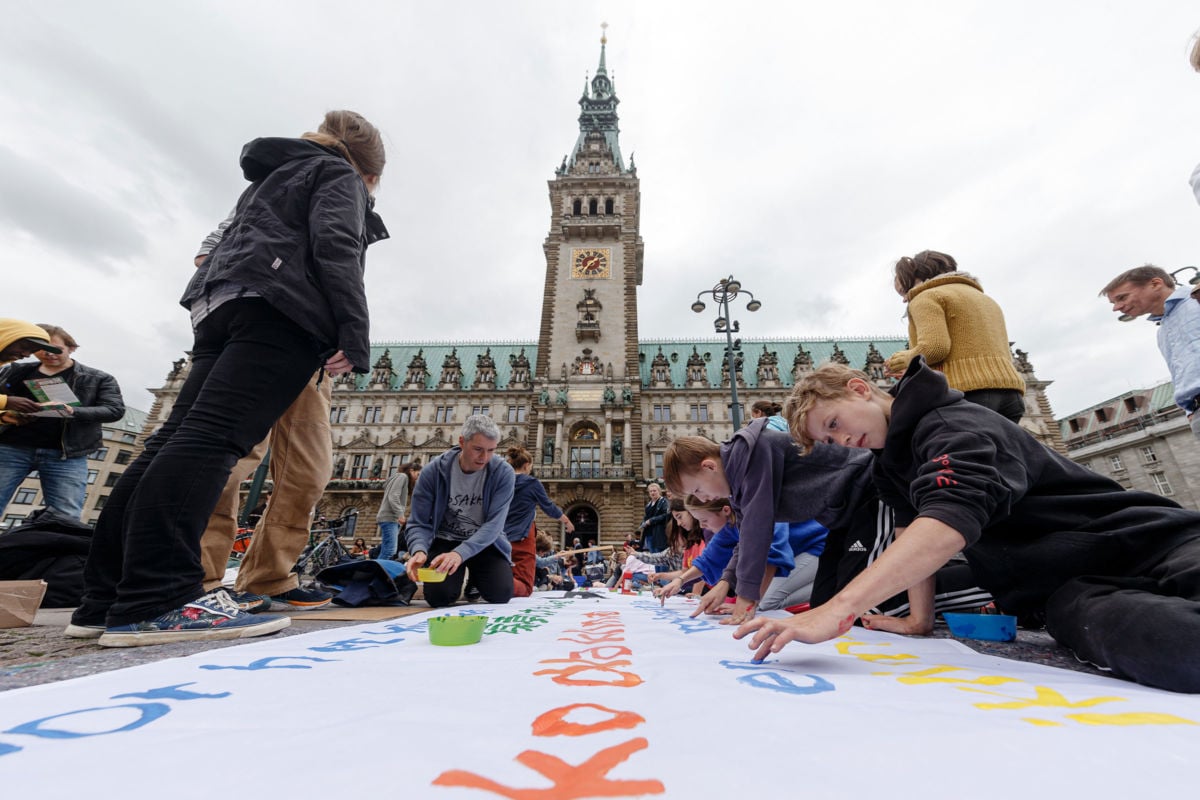Part of the Series
Covering Climate Now
Honest, paywall-free news is rare. Please support our boldly independent journalism with a donation of any size.
What do Ben and Jerry’s, an 800,000-member South African trade union, countless college professors, a big chunk of Amazon’s Seattle workforce, and more high school students than you can imagine have in common? They’re all joining in a massive climate strike this coming Friday, September 20 — a strike that will likely register as the biggest day of climate action in the planet’s history.
More than this, what they have in common is something they share with much of the rest of humanity: a rapidly growing fear that global warming is out of control and that we must act with remarkable speed if we have any hope of getting our civilizations safely through the century. This growing realization is clear in many places: in the UK, for instance, where Extinction Rebellion began its massive civil disobedience, a campaign now spreading around the world. And in Washington, D.C., where the Sunrise Movement and Alexandria Ocasio-Cortez have been building powerful support for a Green New Deal.
But the climate strikes, of course, had their genesis in high schools — or, more exactly, outside of high schools, which is where 16-year-old activist Greta Thunberg found herself last autumn. Why, she asked the Swedish authorities, should I spend all day in school preparing myself for the future when you aren’t preparing the country or the world for the future? That is a good question — so good that it quickly spread around the planet.
I’ve known school strikers on every continent with schools, and they should give everyone heart: Youth activists are awake and aware and working hard. As usual, those in the most vulnerable communities are leading the way. This is a movement in which Indigenous youth, kids from communities of color, and those who live on sinking islands are on the front line.
But these young activists are also asking for help. On May 23, at the end of the last massive school strike, Thunberg and 46 other youth activists released an open letter to The Guardian urging adults to join in next time. Because, as they pointed out, there are limits to what young people can do on their own. If you can’t vote, and if you don’t own stocks, then your ability to pull the main levers of power is limited. They wrote: “Sorry if this is inconvenient for you. But this is not a single-generation job. It’s humanity’s job.”
People around the world are responding to the call. The biggest demonstrations will probably be in New York City, because of the excitement surrounding Thunberg’s arrival by sailboat to address the UN General Assembly. But there will be rallies in all 50 states (a full list is at globalclimatestrike.net). Often, they’ll be led by students at local high schools and colleges, but in many cases, the emphasis is on adult participation — shop owners are closing their doors for the afternoon, and chefs shutting down restaurants to feed demonstrators.
Can this worldwide strike galvanize us into significant climate action? By itself, surely not. No single thing is enough to make a decisive difference — not blocking pipelines or divesting portfolios or electing new senators. But a day in the streets can demonstrate to everyone that the zeitgeist is shifting, and decisively. It’s the zeitgeist that activists really play for: the sense of what is normal, natural, obvious. (Think of how gay marriage now seems conventional to many Americans, and then try to remember what it seemed like to much of the culture a decade ago).
We’re coming up on the 50th anniversary of the first Earth Day. In the spring of 1970, 20 million Americans — 10 percent of the country’s population — took to the street for that protest. It was almost certainly the largest day of political action in its history. And that was enough. The zeitgeist shifted decisively, and Richard Nixon, of all presidents, signed into law all the most important environmental laws, from the Clean Water Act to the Endangered Species Act. (Incidentally, these are all laws that Donald Trump is currently trying to gut.)
You can find the signs to indicate we might be on the cusp of a similar shift. The polling shows that Americans are far more concerned about climate change than even a year or two ago. Partly that’s because of good organizing, partly it’s because the planet continues to demonstrate our folly with fire and flood, and partly it’s because Donald Trump has bellowed his climate denialism so loudly that it’s begun to disconcert everyone who is not in his cult. Surveys show that he’s more out of touch with Americans on the environment than on any other issue. If and when Trump goes, climate denialism as a powerful political force may well go with him.
But even if we leave climate denial behind us, will we really start to move with the speed we must? The answer to that will lie in how many people truly demand action. We’ll start to find out what the numbers look like on September 20.
This story is part of Covering Climate Now, a global collaboration of more than 220 news outlets to strengthen coverage of the climate story.
Media that fights fascism
Truthout is funded almost entirely by readers — that’s why we can speak truth to power and cut against the mainstream narrative. But independent journalists at Truthout face mounting political repression under Trump.
We rely on your support to survive McCarthyist censorship. Please make a tax-deductible one-time or monthly donation.
